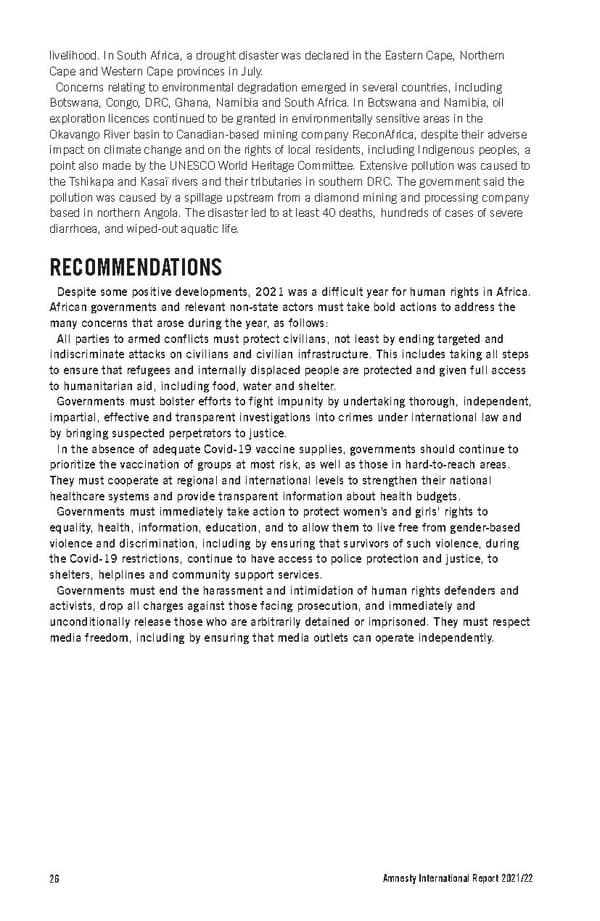livelihood. In South Africa, a drought disaster was declared in the Eastern Cape, Northern Cape and Western Cape provinces in July. Concerns relating to environmental degradation emerged in several countries, including Botswana, Congo, DRC, Ghana, Namibia and South Africa. In Botswana and Namibia, oil exploration licences continued to be granted in environmentally sensitive areas in the Okavango River basin to Canadian-based mining company ReconAfrica, despite their adverse impact on climate change and on the rights of local residents, including Indigenous peoples, a point also made by the UNESCO World Heritage Committee. Extensive pollution was caused to the Tshikapa and Kasaï rivers and their tributaries in southern DRC. The government said the pollution was caused by a spillage upstream from a diamond mining and processing company based in northern Angola. The disaster led to at least 40 deaths, hundreds of cases of severe diarrhoea, and wiped-out aquatic life. RECOMMENDATIONS Despite some positive developments, 2021 was a difficult year for human rights in Africa. African governments and relevant non-state actors must take bold actions to address the many concerns that arose during the year, as follows: All parties to armed conflicts must protect civilians, not least by ending targeted and indiscriminate attacks on civilians and civilian infrastructure. This includes taking all steps to ensure that refugees and internally displaced people are protected and given full access to humanitarian aid, including food, water and shelter. Governments must bolster efforts to fight impunity by undertaking thorough, independent, impartial, effective and transparent investigations into crimes under international law and by bringing suspected perpetrators to justice. In the absence of adequate Covid-19 vaccine supplies, governments should continue to prioritize the vaccination of groups at most risk, as well as those in hard-to-reach areas. They must cooperate at regional and international levels to strengthen their national healthcare systems and provide transparent information about health budgets. Governments must immediately take action to protect women’s and girls’ rights to equality, health, information, education, and to allow them to live free from gender-based violence and discrimination, including by ensuring that survivors of such violence, during the Covid-19 restrictions, continue to have access to police protection and justice, to shelters, helplines and community support services. Governments must end the harassment and intimidation of human rights defenders and activists, drop all charges against those facing prosecution, and immediately and unconditionally release those who are arbitrarily detained or imprisoned. They must respect media freedom, including by ensuring that media outlets can operate independently. Amnesty International Report 2021/22 26
 Amnesty International Report 2021/22 Page 25 Page 27
Amnesty International Report 2021/22 Page 25 Page 27